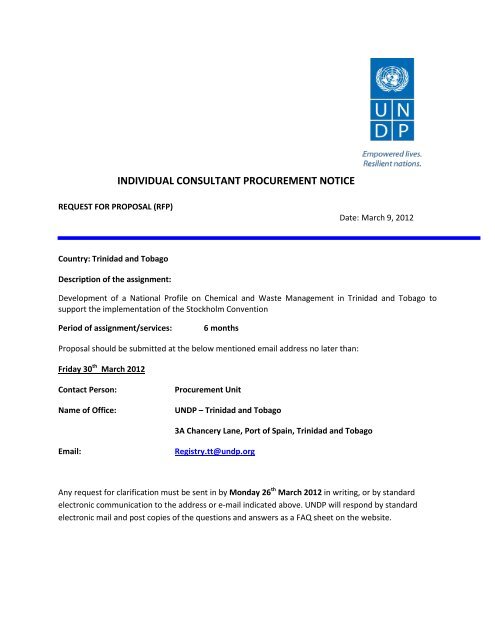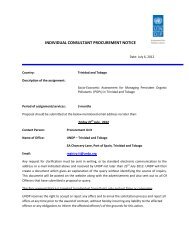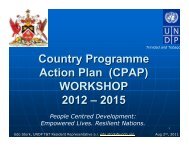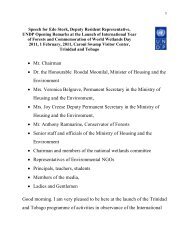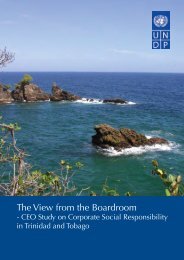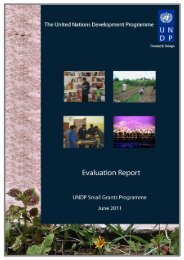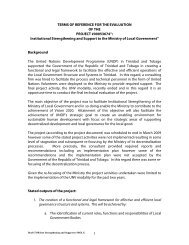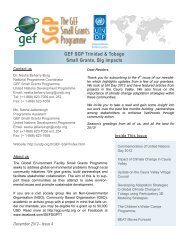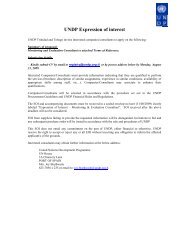individual consultant procurement notice - UNDP Trinidad and Tobago
individual consultant procurement notice - UNDP Trinidad and Tobago
individual consultant procurement notice - UNDP Trinidad and Tobago
You also want an ePaper? Increase the reach of your titles
YUMPU automatically turns print PDFs into web optimized ePapers that Google loves.
INDIVIDUAL CONSULTANT PROCUREMENT NOTICE<br />
REQUEST FOR PROPOSAL (RFP)<br />
Date: March 9, 2012<br />
Country: <strong>Trinidad</strong> <strong>and</strong> <strong>Tobago</strong><br />
Description of the assignment:<br />
Development of a National Profile on Chemical <strong>and</strong> Waste Management in <strong>Trinidad</strong> <strong>and</strong> <strong>Tobago</strong> to<br />
support the implementation of the Stockholm Convention<br />
Period of assignment/services:<br />
6 months<br />
Proposal should be submitted at the below mentioned email address no later than:<br />
Friday 30 th March 2012<br />
Contact Person:<br />
Name of Office:<br />
Procurement Unit<br />
<strong>UNDP</strong> – <strong>Trinidad</strong> <strong>and</strong> <strong>Tobago</strong><br />
3A Chancery Lane, Port of Spain, <strong>Trinidad</strong> <strong>and</strong> <strong>Tobago</strong><br />
Email:<br />
Registry.tt@undp.org<br />
Any request for clarification must be sent in by Monday 26 th March 2012 in writing, or by st<strong>and</strong>ard<br />
electronic communication to the address or e-mail indicated above. <strong>UNDP</strong> will respond by st<strong>and</strong>ard<br />
electronic mail <strong>and</strong> post copies of the questions <strong>and</strong> answers as a FAQ sheet on the website.
1. BACKGROUND<br />
As a signatory to the Stockholm Convention on Persistent Organic Pollutants (POPs), <strong>Trinidad</strong> <strong>and</strong><br />
<strong>Tobago</strong> is developing a National Implementation Plan (NIP) to fulfil its obligations <strong>and</strong> reporting<br />
requirements under the Convention.<br />
At present, the main challenge in <strong>Trinidad</strong> <strong>and</strong> <strong>Tobago</strong> with respect to POPs is related to the existence of<br />
some stocks of pesticides <strong>and</strong> PCBs that require proper inventory, storage <strong>and</strong>/or the economic<br />
resources to effectively manage <strong>and</strong> dispose of them. Due to the challenges posed by chemical <strong>and</strong><br />
waste pollution, it is widely recognized that the proper management of such hazardous wastes is<br />
required in order to promote sustainable development whilst protecting the environment <strong>and</strong> human<br />
health.<br />
A critical step in building national capacities for the management of chemicals is a comprehensive<br />
assessment of the national infrastructure relating to the legal, institutional, administrative <strong>and</strong> technical<br />
aspects of chemicals management, along with an underst<strong>and</strong>ing of the nature <strong>and</strong> extent of chemicals<br />
availability <strong>and</strong> use in the country. Previous national reports have evaluated various aspects of <strong>Trinidad</strong><br />
<strong>and</strong> <strong>Tobago</strong>’s chemical <strong>and</strong> waste management systems, inclusive of legal instruments <strong>and</strong> technical<br />
infrastructure. These assessments provide a useful baseline for further elaboration <strong>and</strong> development of<br />
information related to POPs.<br />
In <strong>Trinidad</strong> <strong>and</strong> <strong>Tobago</strong>, new institutions have been created to address environmental concerns <strong>and</strong><br />
legislation established to support environmental policy. However there is an urgent need to strengthen<br />
Government capacity to address waste management, in particular hazardous waste management, <strong>and</strong><br />
pollution prevention <strong>and</strong> control needs. Laboratory capacity for environmental <strong>and</strong> biological<br />
monitoring of POPs <strong>and</strong> other environmental pollutants needs to be strengthened, as well as the<br />
capacity to assess, communicate <strong>and</strong> manage the human <strong>and</strong> ecosystem risks derived from the exposure<br />
to chemical pollutants.<br />
The Government of <strong>Trinidad</strong> <strong>and</strong> <strong>Tobago</strong> (GORTT) is in receipt of funding provided through the United<br />
Nations Development Programme – Global Environment Facility (<strong>UNDP</strong>/GEF) to implement the project<br />
entitled “Initial Assistance to Enable <strong>Trinidad</strong> <strong>and</strong> <strong>Tobago</strong> to Fulfil its Obligations under the Stockholm<br />
Convention on Persistent Organic Pollutants”. On behalf of the GORTT, the <strong>UNDP</strong> is seeking a suitable<br />
professional to work with the Ministry of Housing <strong>and</strong> the Environment, for the purpose of developing a<br />
National Profile on Chemical <strong>and</strong> Waste Management to support the implementation of the Stockholm<br />
Convention.<br />
2. EXPECTED RESULTS AND KEY DELIVERABLES<br />
The Project Consultant is to develop a National Profile on Chemical <strong>and</strong> Waste Management in <strong>Trinidad</strong><br />
<strong>Tobago</strong> to support the implementation of the Stockholm Convention. The <strong>consultant</strong> will perform the<br />
project activities in cooperation <strong>and</strong> coordination with other members of the Project Team under the<br />
guidance of the Project Manager.<br />
Under the responsibility the Project Manager, the Project Consultant has the following principal<br />
responsibilities <strong>and</strong> deliverables:
1. Report on the institutional <strong>and</strong> legal framework for chemical <strong>and</strong> waste management with a<br />
focus on POPs, that includes:<br />
a. An inventory of the institutions involved in chemical <strong>and</strong> waste management, their<br />
organizational structure, objectives, main activities, legal m<strong>and</strong>ate <strong>and</strong> relevance for the<br />
implementation of the Stockholm Convention<br />
b. An inventory of the relevant laws, regulations <strong>and</strong> st<strong>and</strong>ards that support chemical <strong>and</strong><br />
waste management<br />
c. An assessment of the effectiveness of national legislative, regulatory <strong>and</strong> enforcement<br />
infrastructure that are in place to comply with chemical <strong>and</strong> waste management related<br />
conventions<br />
d. An assessment of the coordination mechanisms among governmental agencies <strong>and</strong><br />
public consultation/participation mechanisms that support the development of<br />
regulatory instruments related to chemical <strong>and</strong> waste management<br />
e. An evaluation of needs <strong>and</strong> potential strategies to strengthen the institutional <strong>and</strong> legal<br />
framework for chemical <strong>and</strong> waste management.<br />
2. Report on monitoring <strong>and</strong> assessment capacity for chemical <strong>and</strong> waste management with a<br />
focus on POPs, that includes:<br />
a. An inventory of both public <strong>and</strong> private laboratories that are involved in chemical,<br />
environmental <strong>and</strong> biological monitoring, with particular focus on POPs<br />
b. An inventory of institutions/research centres involved in or aware of risk assessments<br />
applied to chemical <strong>and</strong> hazardous wastes evaluations<br />
c. An assessment of mechanisms in place for quality control/assurance <strong>and</strong> accreditation<br />
of laboratories<br />
d. An evaluation of needs <strong>and</strong> potential strategies to strengthen the monitoring <strong>and</strong><br />
analysis capacity for chemical <strong>and</strong> waste management<br />
e. An evaluation of needs <strong>and</strong> potential strategies to strengthen the risk assessment<br />
capacity for chemical <strong>and</strong> waste management.<br />
3. Report on infrastructure capacity for chemical <strong>and</strong> waste management with a focus on POPs,<br />
that includes:<br />
a. An inventory of existing infrastructure <strong>and</strong> capacities for the management of hazardous<br />
wastes such as installation/disposal procedures, available technologies <strong>and</strong> trained<br />
personnel etc.<br />
b. An inventory of existing capacity <strong>and</strong> institutional arrangements for information systems<br />
<strong>and</strong> public dissemination of information relating to environmental chemical<br />
management, pollution prevention <strong>and</strong> control<br />
c. An assessment of existing systems for managing industrial hazardous wastes<br />
d. An evaluation of needs <strong>and</strong> potential strategies to strengthen the sound management<br />
<strong>and</strong> disposal of hazardous wastes<br />
e. An evaluation of needs <strong>and</strong> potential strategies to strengthen the information systems<br />
<strong>and</strong> public dissemination of information relating to chemical <strong>and</strong> waste management.<br />
4. To facilitate a training workshop (three days) <strong>and</strong> prepare a workshop report on the integral<br />
<strong>and</strong> environmentally sound management of hazardous chemicals, waste legislation, needs <strong>and</strong><br />
methodologies to assess exposure <strong>and</strong> risk, <strong>and</strong> options for management <strong>and</strong> elimination of<br />
POPs.
5. National Profile on chemical <strong>and</strong> waste management in <strong>Trinidad</strong> <strong>and</strong> <strong>Tobago</strong> that incorporates<br />
the above mentioned inventories, assessments <strong>and</strong> strategy reports <strong>and</strong> supports the<br />
implementation of the Stockholm Convention.<br />
4. QUALIFICATION AND EXPERIENCE:<br />
The c<strong>and</strong>idate should be highly motivated <strong>and</strong> capable of working independently. The ability to work<br />
with a wide variety of stakeholders from governments, agencies, private companies, NGOs, <strong>and</strong> research<br />
institutions is essential. A good underst<strong>and</strong>ing of the institutional framework relating to the<br />
management of chemicals including POPs is highly desirable.<br />
In addition, the Project Consultant should possess:<br />
• A post graduate degree in Physical Sciences or Environmental Sciences <strong>and</strong> a minimum of<br />
three (3) years experience with chemical waste management including practical work in<br />
relevant industry, other relevant processes, <strong>and</strong> knowledge on monitoring <strong>and</strong> analysis of<br />
hazardous wastes or any equivalent combination of training <strong>and</strong> experience<br />
• Some level of legal training <strong>and</strong> experience would be an asset<br />
• Experience in training <strong>and</strong> facilitating workshops would be an asset<br />
• Good working relations with both government <strong>and</strong> non-government entities<br />
• Strong oral <strong>and</strong> written communication skills<br />
• Strong interpersonal <strong>and</strong> facilitation skills<br />
• Good written <strong>and</strong> spoken English<br />
• Working knowledge of the Stockholm Convention on Persistent Organic Pollutants <strong>and</strong> other<br />
relevant global conventions such as the Basel Convention <strong>and</strong> the Rotterdam Convention would<br />
be an asset
5. DOCUMENTS TO BE INCLUDED WHEN SUBMITTING THE PROPOSALS.<br />
Interested <strong>individual</strong> <strong>consultant</strong>s must submit the following documents/information to demonstrate their<br />
qualifications:<br />
(1) TECHNICAL PROPOSAL:<br />
(i) A letter explaining the c<strong>and</strong>idates’ suitability for this consultancy<br />
(ii) Completion of P11 Form including past experience in similar projects <strong>and</strong> at least 3 references<br />
(2) FINANCIAL PROPOSAL: Completion of Form 1 Attached.<br />
LUMP SUM CONTRACTS<br />
The financial proposal shall specify a total lump sum amount, <strong>and</strong> payment terms around specific <strong>and</strong><br />
measureable (qualitative <strong>and</strong> quantitative) deliverables.<br />
6. EVALUATION<br />
Payments are based upon output i.e. 100 % of contract value will be paid upon delivery <strong>and</strong> satisfactory<br />
completion of the services specified in the TOR.<br />
In order to assist the requesting unit in the comparison of financial proposals, the financial proposal shall<br />
include a breakdown of this lump sum amount (including travel, per diems, <strong>and</strong> number of anticipated<br />
work days) The Financial Proposal shall be presented using the enclosed format of Annex 2<br />
TRAVEL:<br />
All envisaged travel costs must be included in the financial proposal. This includes all travel to join duty<br />
station/repatriation travel. In general, <strong>UNDP</strong> should not accept travel costs exceeding those of an<br />
economy class ticket. Should the IC wish to travel on a higher class he/she should do so using their own<br />
resources.<br />
In case of unforeseeable travel, payment of travel costs including tickets, lodging <strong>and</strong> terminal expenses<br />
should be agreed upon, between the respective business unit <strong>and</strong> Individual <strong>consultant</strong> , prior to travel<br />
<strong>and</strong> will be reimbursed.
6. EVALUATION OF OFFERS<br />
<strong>UNDP</strong> will award contract to the offer that guarantees the best value for money. Thus, award will be<br />
made to the lowest priced technically acceptable offer. The technical criteria are described in the<br />
following table:<br />
Technical 7. FINANCIAL criteria OFFER. (as described in chapter IV above)<br />
Maximum<br />
points*<br />
Person<br />
A<br />
Person<br />
B<br />
Person<br />
C<br />
Please 1 Education fill in Form 1 (Annex 2) attached, to express your price 20 offer for the services required in this<br />
Request for Proposal, Your price proposal would includes costs such as your remuneration plus the per<br />
diem 2 Experience expense for <strong>and</strong> each Formal day in training <strong>Trinidad</strong> <strong>and</strong> round trip at economy 60 class from your place of residence to<br />
Port of Spain, <strong>Trinidad</strong>.<br />
3 Personal skills 10<br />
All prices shall be quoted in <strong>Trinidad</strong> <strong>and</strong> <strong>Tobago</strong> dollars (TTD) or to nearest US dollar. For comparison<br />
purposes, 4 Language all offers skills expressed in other currencies but <strong>Trinidad</strong> 10 <strong>and</strong> <strong>Tobago</strong> dollars, would be converted<br />
to <strong>Trinidad</strong> <strong>and</strong> <strong>Tobago</strong> dollars using the United Nations Operational Rate of Exchange, e.g. 1 USD = 6.33<br />
TTD<br />
Total 100<br />
The schedule of payments will be discussed with the successful c<strong>and</strong>idate at a later stage in more detail.<br />
<strong>UNDP</strong> Lowest-priced will not process technically visa for compliant the <strong>consultant</strong>. offer (point system with a minimum threshold):<br />
Hotel “The prices financial can proposal be approximately of only those $210 USD offerors per night; obtaining a regular the minimum meal rounds 75% from score $10 during USD per technical meal<br />
<strong>and</strong> evaluation sundry expenses should be may opened. amount The to: remaining taxi (approx. financial $30.00 proposals per day) of – from offerors Hotel/Guesthouse whose technical in proposals <strong>Trinidad</strong><br />
to are <strong>UNDP</strong>’s deemed office, unqualified miscellaneous <strong>and</strong> non-responsive (approx. $45.00 shall USD) be remain unopened. The contract will be award to the<br />
company meeting the minimum 75% score in the technical evaluation <strong>and</strong> offering the lowest price.”<br />
The procuring <strong>UNDP</strong> entity, Country Office <strong>Trinidad</strong> <strong>and</strong> <strong>Tobago</strong> reserves the right to accept or reject any<br />
Proposal, <strong>and</strong> to annul the solicitation process <strong>and</strong> reject all Proposals at any time prior to award of<br />
contract, without thereby incurring any liability to the affected Offeror or any obligation to inform the<br />
affected Offeror or Offerors of the grounds for the Purchaser’s action. <strong>UNDP</strong> reserves the right at the<br />
time of award of contract to vary the quantity of services <strong>and</strong> goods specified in this RFP without any<br />
change in price or other terms <strong>and</strong> conditions.
TIMELINES<br />
ACTIVITY<br />
DUE ON<br />
DEADLINE FOR RECEIPT OF OFFERS 30 th March 2012<br />
SHORTLISTING OF OFFERS 10 th April 2012<br />
NOTIFYING OF SHORTLISTED CANDIDATES 17 th April 2012<br />
INTERVIEWING OF SHORTLISTED CANDIDATES 23 rd – 27 th April 2012<br />
INTERVIEW REPORT/CONTRACT AWARD 30 th April – 11 th May 2012<br />
START DATE FOR SUCESSFUL CANDIDATE 21 st May 2012
I. FORMS TO SUBMIT OFFER/PROPOSAL.<br />
The person interested in the post described above, shall submit the following documents:<br />
Document Description File<br />
Introductory<br />
Letter<br />
A letter explaining the c<strong>and</strong>idates’ suitability for this<br />
consultancy<br />
Resume<br />
Price or<br />
quote<br />
Please fill in <strong>and</strong> sign P11 form attached. Please double<br />
click on the icon:<br />
Use Form 1 (compulsory). Your quote shall include all cost<br />
or taxes involved. Please double click on the icon:<br />
P11 form<br />
Form 1 Attached<br />
Legal<br />
documents<br />
Valid passport <strong>and</strong>/ or Visa may be required in <strong>Trinidad</strong>. <strong>UNDP</strong> will not process<br />
Visas for the <strong>consultant</strong>.<br />
General Conditions of the Contract (please double click on the icon:<br />
Attached<br />
Annexed<br />
<strong>and</strong><br />
Annexes:<br />
Annex 1 – Terms of Reference<br />
Annex 2 – Price Proposal Submission – Form 1<br />
Annex 3 – Link to P11 form<br />
Annex 4 - General Terms <strong>and</strong> Conditions of the Individual Contract
Annex 1<br />
TERMS OF REFERENCE<br />
Project Consultant (Contract)<br />
with the Ministry of Housing <strong>and</strong> the Environment<br />
of <strong>Trinidad</strong> <strong>and</strong> <strong>Tobago</strong><br />
Project:<br />
Development of a National Profile on Chemical <strong>and</strong> Waste Management in<br />
<strong>Trinidad</strong> <strong>and</strong> <strong>Tobago</strong> to support the implementation of the Stockholm<br />
Convention<br />
Duty Station:<br />
Port of Spain, <strong>Trinidad</strong> <strong>and</strong> <strong>Tobago</strong><br />
Duration of Project:<br />
6 months<br />
Type of contract:<br />
Individual Contract<br />
1. Background<br />
As a signatory to the Stockholm Convention on Persistent Organic Pollutants (POPs), <strong>Trinidad</strong> <strong>and</strong><br />
<strong>Tobago</strong> is developing a National Implementation Plan (NIP) to fulfil its obligations <strong>and</strong> reporting<br />
requirements under the Convention.<br />
At present, the main challenge in <strong>Trinidad</strong> <strong>and</strong> <strong>Tobago</strong> with respect to POPs is related to the existence of<br />
some stocks of pesticides <strong>and</strong> PCBs that require proper inventory, storage <strong>and</strong>/or the economic<br />
resources to effectively manage <strong>and</strong> dispose of them. Due to the challenges posed by chemical <strong>and</strong><br />
waste pollution, it is widely recognized that the proper management of such hazardous wastes is<br />
required in order to promote sustainable development whilst protecting the environment <strong>and</strong> human<br />
health.
A critical step in building national capacities for the management of chemicals is a comprehensive<br />
assessment of the national infrastructure relating to the legal, institutional, administrative <strong>and</strong> technical<br />
aspects of chemicals management, along with an underst<strong>and</strong>ing of the nature <strong>and</strong> extent of chemicals<br />
availability <strong>and</strong> use in the country. Previous national reports have evaluated various aspects of <strong>Trinidad</strong><br />
<strong>and</strong> <strong>Tobago</strong>’s chemical <strong>and</strong> waste management systems, inclusive of legal instruments <strong>and</strong> technical<br />
infrastructure. These assessments provide a useful baseline for further elaboration <strong>and</strong> development of<br />
information related to POPs.<br />
In <strong>Trinidad</strong> <strong>and</strong> <strong>Tobago</strong>, new institutions have been created to address environmental concerns <strong>and</strong><br />
legislation established to support environmental policy. However there is an urgent need to strengthen<br />
Government capacity to address waste management, in particular hazardous waste management, <strong>and</strong><br />
pollution prevention <strong>and</strong> control needs. Laboratory capacity for environmental <strong>and</strong> biological<br />
monitoring of POPs <strong>and</strong> other environmental pollutants needs to be strengthened, as well as the<br />
capacity to assess, communicate <strong>and</strong> manage the human <strong>and</strong> ecosystem risks derived from the exposure<br />
to chemical pollutants.<br />
The Government of <strong>Trinidad</strong> <strong>and</strong> <strong>Tobago</strong> (GORTT) is in receipt of funding provided through the United<br />
Nations Development Programme – Global Environment Facility (<strong>UNDP</strong>/GEF) to implement the project<br />
entitled “Initial Assistance to Enable <strong>Trinidad</strong> <strong>and</strong> <strong>Tobago</strong> to Fulfil its Obligations under the Stockholm<br />
Convention on Persistent Organic Pollutants”. On behalf of the GORTT, the <strong>UNDP</strong> is seeking a suitable<br />
professional to work with the Ministry of Housing <strong>and</strong> the Environment, for the purpose of developing a<br />
National Profile on Chemical <strong>and</strong> Waste Management to support the implementation of the Stockholm<br />
Convention.<br />
2. Expected Results <strong>and</strong> Key Deliverables<br />
The Project Consultant is to develop a National Profile on Chemical <strong>and</strong> Waste Management in <strong>Trinidad</strong><br />
<strong>Tobago</strong> to support the implementation of the Stockholm Convention. The <strong>consultant</strong> will perform the<br />
project activities in cooperation <strong>and</strong> coordination with other members of the Project Team under the<br />
guidance of the Project Manager.<br />
Under the responsibility the Project Manager, the Project Consultant has the following principal<br />
responsibilities <strong>and</strong> deliverables:<br />
1. Report on the institutional <strong>and</strong> legal framework for chemical <strong>and</strong> waste management with a<br />
focus on POPs, that includes:<br />
a. An inventory of the institutions involved in chemical <strong>and</strong> waste management, their<br />
organizational structure, objectives, main activities, legal m<strong>and</strong>ate <strong>and</strong> relevance for the<br />
implementation of the Stockholm Convention<br />
b. An inventory of the relevant laws, regulations <strong>and</strong> st<strong>and</strong>ards that support chemical <strong>and</strong><br />
waste management<br />
c. An assessment of the effectiveness of national legislative, regulatory <strong>and</strong> enforcement<br />
infrastructure that are in place to comply with chemical <strong>and</strong> waste management related<br />
conventions<br />
d. An assessment of the coordination mechanisms among governmental agencies <strong>and</strong><br />
public consultation/participation mechanisms that support the development of<br />
regulatory instruments related to chemical <strong>and</strong> waste management
e. An evaluation of needs <strong>and</strong> potential strategies to strengthen the institutional <strong>and</strong> legal<br />
framework for chemical <strong>and</strong> waste management.<br />
2. Report on monitoring <strong>and</strong> assessment capacity for chemical <strong>and</strong> waste management with a<br />
focus on POPs, that includes:<br />
a. An inventory of both public <strong>and</strong> private laboratories that are involved in chemical,<br />
environmental <strong>and</strong> biological monitoring, with particular focus on POPs<br />
b. An inventory of institutions/research centres involved in or aware of risk assessments<br />
applied to chemical <strong>and</strong> hazardous wastes evaluations<br />
c. An assessment of mechanisms in place for quality control/assurance <strong>and</strong> accreditation<br />
of laboratories<br />
d. An evaluation of needs <strong>and</strong> potential strategies to strengthen the monitoring <strong>and</strong><br />
analysis capacity for chemical <strong>and</strong> waste management<br />
e. An evaluation of needs <strong>and</strong> potential strategies to strengthen the risk assessment<br />
capacity for chemical <strong>and</strong> waste management.<br />
3. Report on infrastructure capacity for chemical <strong>and</strong> waste management with a focus on POPs,<br />
that includes:<br />
a. An inventory of existing infrastructure <strong>and</strong> capacities for the management of hazardous<br />
wastes such as installation/disposal procedures, available technologies <strong>and</strong> trained<br />
personnel etc.<br />
b. An inventory of existing capacity <strong>and</strong> institutional arrangements for information systems<br />
<strong>and</strong> public dissemination of information relating to environmental chemical<br />
management, pollution prevention <strong>and</strong> control<br />
c. An assessment of existing systems for managing industrial hazardous wastes<br />
d. An evaluation of needs <strong>and</strong> potential strategies to strengthen the sound management<br />
<strong>and</strong> disposal of hazardous wastes<br />
e. An evaluation of needs <strong>and</strong> potential strategies to strengthen the information systems<br />
<strong>and</strong> public dissemination of information relating to chemical <strong>and</strong> waste management.<br />
4. To facilitate a training workshop (three days) <strong>and</strong> prepare a workshop report on the integral<br />
<strong>and</strong> environmentally sound management of hazardous chemicals, waste legislation, needs <strong>and</strong><br />
methodologies to assess exposure <strong>and</strong> risk, <strong>and</strong> options for management <strong>and</strong> elimination of<br />
POPs.<br />
5. National Profile on chemical <strong>and</strong> waste management in <strong>Trinidad</strong> <strong>and</strong> <strong>Tobago</strong> that incorporates<br />
the above mentioned inventories, assessments <strong>and</strong> strategy reports <strong>and</strong> supports the<br />
implementation of the Stockholm Convention.
4. Qualifications <strong>and</strong> Experience<br />
The c<strong>and</strong>idate should be highly motivated <strong>and</strong> capable of working independently. The ability to work<br />
with a wide variety of stakeholders from governments, agencies, private companies, NGOs, <strong>and</strong> research<br />
institutions is essential. A good underst<strong>and</strong>ing of the institutional framework relating to the<br />
management of chemicals including POPs is highly desirable.<br />
In addition, the Project Consultant should possess:<br />
• A post graduate degree in Physical Sciences or Environmental Sciences <strong>and</strong> a minimum of<br />
three (3) years experience with chemical waste management including practical work in<br />
relevant industry, other relevant processes, <strong>and</strong> knowledge on monitoring <strong>and</strong> analysis of<br />
hazardous wastes or any equivalent combination of training <strong>and</strong> experience<br />
• Some level of legal training <strong>and</strong> experience would be an asset<br />
• Experience in training <strong>and</strong> facilitating workshops would be an asset<br />
• Good working relations with both government <strong>and</strong> non-government entities<br />
• Strong oral <strong>and</strong> written communication skills<br />
• Strong interpersonal <strong>and</strong> facilitation skills<br />
• Good written <strong>and</strong> spoken English<br />
• Working knowledge of the Stockholm Convention on Persistent Organic Pollutants <strong>and</strong> other<br />
relevant global conventions such as the Basel Convention <strong>and</strong> the Rotterdam Convention would<br />
be an asset<br />
5. Duration<br />
The assignment must be completed within six (6) months of the start date.<br />
6. Reporting Requirements<br />
The Project Consultant will report directly to the Project Manager. At the end of the contracted time<br />
period, the Project Consultant shall submit all project outputs to the Project Manager which will be<br />
assessed for validity <strong>and</strong> completeness of required information, <strong>and</strong> should be in the desired format<br />
identified by the client. Once approved by the Project Manager, all outputs become the property of the<br />
client to utilise <strong>and</strong> disseminate as deemed necessary.<br />
7. Terms of Payment<br />
20% on submission <strong>and</strong> acceptance of the report on the institutional <strong>and</strong> legal framework for<br />
chemical <strong>and</strong> waste management in <strong>Trinidad</strong> <strong>and</strong> <strong>Tobago</strong>.<br />
20% on submission <strong>and</strong> acceptance of the report on monitoring <strong>and</strong> assessment capacity for<br />
chemical <strong>and</strong> waste management in <strong>Trinidad</strong> <strong>and</strong> <strong>Tobago</strong>.<br />
20% on submission <strong>and</strong> acceptance of the report on infrastructure capacity for chemical <strong>and</strong><br />
waste management in <strong>Trinidad</strong> <strong>and</strong> <strong>Tobago</strong> <strong>and</strong> the successful completion of a training<br />
workshop <strong>and</strong> workshop report on the integral <strong>and</strong> environmentally sound management of<br />
hazardous chemicals, waste legislation, needs <strong>and</strong> methodologies to assess exposure <strong>and</strong> risk,<br />
<strong>and</strong> options for management <strong>and</strong> elimination of POPs.<br />
40% on submission <strong>and</strong> acceptance of the National Profile on Chemical <strong>and</strong> Waste Management<br />
in <strong>Trinidad</strong> <strong>and</strong> <strong>Tobago</strong>.
Annex 2<br />
Price Submission Form<br />
Form 1.<br />
Resident Representative<br />
United Nations Development Programme, <strong>Trinidad</strong> <strong>and</strong> <strong>Tobago</strong><br />
Having examined the Solicitation Documents, the receipt of which is hereby duly acknowledged, I, the<br />
undersigned, offer to provide (the requested services) for the total sum of (indicate amount in number<br />
<strong>and</strong> letters) including applicable taxes, plus the per diem expenses as may be ascertained in<br />
accordance with the Price Schedule described below <strong>and</strong> made part of this Offer.<br />
Price Schedule<br />
Description of Activity/Item Days Daily rate<br />
Total Amount<br />
(Currency)<br />
1. Consultancy work<br />
2. Per diem expenses<br />
3.<br />
Return Airfare from place of<br />
residence to <strong>Trinidad</strong> – economy<br />
class – most direct <strong>and</strong> economic<br />
route<br />
I undertake, if my Offer is accepted, to commence <strong>and</strong> complete delivery of all services specified in the<br />
contract within the time frame stipulated.<br />
I agree to abide by this Offer for a period of 60 days from the date fixed for receiving of Offers in the<br />
Request for Quotation, <strong>and</strong> it shall remain binding upon me <strong>and</strong> may be accepted at any time before<br />
the expiration of that period.<br />
I underst<strong>and</strong> that you are not bound to accept any Offer you may receive.<br />
Date:
Name <strong>and</strong> signature:<br />
Annex 3.<br />
P11 FORM: http://www.undp.org.tt/Jobs/P11%20Personal%20history%20form.doc
Annex 4.<br />
G E N E R A L C O N D I T I O N S O F C O N T R A C T FOR THE SERVICES OF INDIVIDUAL<br />
CONTRACTORS 1 Version 1st January 2011<br />
1. LEGAL STATUS: The Individual contractor shall have the legal status of an independent contractor<br />
vis-à-vis the United Nations Development Programme (<strong>UNDP</strong>), <strong>and</strong> shall not be regarded, for any<br />
purposes, as being either a “staff member” of <strong>UNDP</strong>, under the UN’ Staff Regulations <strong>and</strong> Rules, or an<br />
“official” of <strong>UNDP</strong>, for purposes of the Convention on the Privileges <strong>and</strong> Immunities of the United<br />
Nations, adopted by the General Assembly of the United Nations on 13 February 1946. Accordingly,<br />
nothing within or relating to the Contract shall establish the relationship of employer <strong>and</strong> employee,<br />
or of principal <strong>and</strong> agent, between <strong>UNDP</strong> <strong>and</strong> the Individual contractor. The officials, representatives,<br />
employees or subcontractors of <strong>UNDP</strong> <strong>and</strong> of the Individual contractor, if any, shall not be considered<br />
in any respect as being the employees or agents of the other, <strong>and</strong> <strong>UNDP</strong> <strong>and</strong> the Individual contractor<br />
shall be solely responsible for all claims arising out of or relating to its engagement of such persons or<br />
entities.<br />
2. STANDARDS OF CONDUCT: In General: The Individual contractor shall neither seek nor accept<br />
instructions from any authority external to <strong>UNDP</strong> in connection with the performance of its<br />
obligations under the Contract. Should any authority external to <strong>UNDP</strong> seek to impose any<br />
instructions on the Contract regarding the Individual contractor’s performance under the Contract,<br />
the Individual contractor shall promptly notify <strong>UNDP</strong> <strong>and</strong> shall provide all reasonable assistance<br />
required by <strong>UNDP</strong>. The Individual contractor shall not take any action in respect of its performance of<br />
the Contract or otherwise related to its obligations under the Contract that may adversely affect the<br />
interests of <strong>UNDP</strong>, <strong>and</strong> the Individual contractor shall perform its obligations under the Contract with<br />
the fullest regard to the interests of <strong>UNDP</strong>. The Individual contractor warrants that it has not <strong>and</strong> shall<br />
not offer any direct or indirect benefit arising from or related to the performance of the Contract or the<br />
award thereof to any representative, official, employee or other agent of <strong>UNDP</strong>. The Individual<br />
contractor shall comply with all laws, ordinances, rules <strong>and</strong> regulations bearing upon the performance<br />
of its obligations under the Contract. In the performance of the Contract the Individual contractor<br />
shall comply with the st<strong>and</strong>ards of conduct set in the Secretary General’s Bulletin ST/SGB/2002/9 of 18<br />
June 2002, entitled “Regulations Governing the Status, Basic Rights <strong>and</strong> Duties of Officials other than<br />
Secretariat Officials, <strong>and</strong> Expert on Mission”. The <strong>individual</strong> contractor must comply with all Security<br />
Directives issued by <strong>UNDP</strong>. Failure to comply with such security directives is grounds for termination<br />
of the Individual contractor for cause.<br />
Prohibition of Sexual Exploitation <strong>and</strong> Abuse: In the performance of the Contract, the Individual<br />
contractor shall comply with the st<strong>and</strong>ards of conduct set forth in the Secretary-General’s bulletin<br />
ST/SGB/2003/13 of 9 October 2003, concerning “Special measures for protection from sexual<br />
exploitation <strong>and</strong> sexual abuse”. In particular, the Individual contractor shall not engage in any conduct<br />
that would constitute sexual exploitation or sexual abuse, as defined in that bulletin.<br />
The Individual contractor acknowledges <strong>and</strong> agrees that any breach of any of the provisions hereof<br />
shall constitute a breach of an essential term of the Contract, <strong>and</strong>, in addition to any other legal rights<br />
or remedies available to any person, shall give rise to grounds for termination of the Contract. In<br />
addition, nothing herein shall limit the right of <strong>UNDP</strong> to refer any alleged breach of the foregoing<br />
st<strong>and</strong>ards of conduct to the relevant national authorities for appropriate legal action.<br />
3. TITLE RIGHTS, COPYRIGHTS, PATENTS AND OTHER PROPRIETARY RIGHTS: Title to any<br />
equipment <strong>and</strong> supplies that may be furnished by <strong>UNDP</strong> to the Individual contractor for the<br />
performance of any obligations under the Contract shall rest with <strong>UNDP</strong>, <strong>and</strong> any such equipment
shall be returned to <strong>UNDP</strong> at the conclusion of the Contract or when no longer needed by the<br />
Individual contractor. Such equipment, when returned to <strong>UNDP</strong>, shall be in the same condition as<br />
when delivered to the Individual contractor, subject to normal wear <strong>and</strong> tear, <strong>and</strong> the Individual<br />
contractor shall be liable to compensate <strong>UNDP</strong> for any damage or degradation of the equipment that<br />
is beyond normal wear <strong>and</strong> tear.<br />
<strong>UNDP</strong> shall be entitled to all intellectual property <strong>and</strong> other proprietary rights, including, but not<br />
limited to, patents, copyrights <strong>and</strong> trademarks, with regard to products, processes, inventions, ideas,<br />
know-how or documents <strong>and</strong> other materials which the Individual contractor has developed for <strong>UNDP</strong><br />
under the Contract <strong>and</strong> which bear a direct relation to or are produced or prepared or collected in<br />
consequence of, or during the course of, the performance of the Contract, <strong>and</strong> the Individual<br />
contractor acknowledges <strong>and</strong> agrees that such products, documents <strong>and</strong> other materials constitute<br />
works made for hire for <strong>UNDP</strong>. However, to the extent that any such intellectual property or other<br />
proprietary rights consist of any intellectual property or other proprietary rights of the Individual<br />
contractor: (a) that pre-existed the performance by the Individual contractor of its obligations under<br />
the Contract, or (b) that the Individual contractor may develop or acquire, or may have developed or<br />
acquired, independently of the performance of its obligations under the Contract, <strong>UNDP</strong> does not <strong>and</strong><br />
shall not claim any ownership interest thereto, <strong>and</strong> the Individual contractor grants to <strong>UNDP</strong> a<br />
perpetual licence to use such intellectual property or other proprietary right solely for the purposes of<br />
<strong>and</strong> in accordance with the requirements of the Contract. At the request of <strong>UNDP</strong>, the Individual<br />
contractor shall take all necessary steps, execute all necessary documents <strong>and</strong> generally assist in<br />
securing such proprietary rights <strong>and</strong> transferring or licensing them to <strong>UNDP</strong> in compliance with the<br />
requirements of the applicable law <strong>and</strong> of the Contract. Subject to the foregoing provisions, all maps,<br />
drawings, photographs, mosaics, plans, reports, estimates, recommendations, documents <strong>and</strong> all<br />
other data compiled by or received by the Individual contractor under the Contract shall be the<br />
property of <strong>UNDP</strong>, shall be made available for use or inspection by <strong>UNDP</strong> at reasonable times <strong>and</strong> in<br />
reasonable places, shall be treated as confidential <strong>and</strong> shall be delivered only to <strong>UNDP</strong> authorized<br />
officials on completion of work under the Contract<br />
4. CONFIDENTIAL NATURE OF DOCUMENTS AND INFORMATION: Information <strong>and</strong> data that are<br />
considered proprietary by either <strong>UNDP</strong> or the Individual contractor or that are delivered or disclosed<br />
by one of them (“Discloser”) to the other (“Recipient”) during the course of performance of the<br />
Contract, <strong>and</strong> that are designated as confidential (“Information”), shall be held in confidence <strong>and</strong> shall<br />
be h<strong>and</strong>led as follows. The Recipient of such Information shall use the same care <strong>and</strong> discretion to<br />
avoid disclosure, publication or dissemination of the Discloser’s Information as it uses with its own<br />
similar information that it does not wish to disclose, publish or disseminate, <strong>and</strong> the Recipient may<br />
otherwise use the Discloser’s Information solely for the purpose for which it was disclosed. The<br />
Recipient may disclose confidential Information to any other party with the Discloser’s prior written<br />
consent, as well as to the Recipient’s employees, officials, representatives <strong>and</strong> agents who have a need<br />
to know such confidential Information solely for purposes of performing obligations under the<br />
Contract. Subject to <strong>and</strong> without any waiver of the privileges <strong>and</strong> immunities of <strong>UNDP</strong>, the Individual<br />
contractor may disclose Information to the extent required by law, provided that the Individual<br />
contractor will give <strong>UNDP</strong> sufficient prior <strong>notice</strong> of a request for the disclosure of Information in order<br />
to allow <strong>UNDP</strong> to have a reasonable opportunity to take protective measures or such other action as<br />
may be appropriate before any such disclosure is made. <strong>UNDP</strong> may disclose Information to the extent<br />
as required pursuant to the Charter of the United Nations, resolutions or regulations of the General<br />
Assembly or its other governing bodies, or rules promulgated by the Secretary-General. The Recipient<br />
shall not be precluded from disclosing Information that is obtained by the Recipient from a third party<br />
without restriction, is disclosed by the Discloser to a third party without any obligation of<br />
confidentiality, is previously known by the Recipient, or at any time is developed by the Recipient<br />
completely independently of any disclosures hereunder. These obligations <strong>and</strong> restrictions of
confidentiality shall be effective during the term of the Contract, including any extension thereof, <strong>and</strong>,<br />
unless otherwise provided in the Contract, shall remain effective following any termination of the<br />
Contract.<br />
5. TRAVEL, MEDICAL CLEARANCE AND SERVICE INCURRED DEATH, INJURY OR ILLNESS: If the<br />
Individual contractor is required by <strong>UNDP</strong> to travel beyond commuting distance from the Individual<br />
contractor’s usual place of residence, <strong>and</strong> upon prior written agreement, such travel shall be at the<br />
expense of <strong>UNDP</strong>. Such travel shall be at economy care when by air.<br />
<strong>UNDP</strong> may require the Individual contractor to submit a Statement of Good Health from a recognized<br />
physician prior to commencement of work in any offices or premises of <strong>UNDP</strong> or before engaging in<br />
any travel required by <strong>UNDP</strong> or connected with the performance of the Contract. The Individual<br />
contractor shall provide such a Statement of Good Health as soon as practicable following such<br />
request, <strong>and</strong> prior to engaging in any such travel, <strong>and</strong> the Individual contractor warrants the accuracy<br />
of any such Statement, including, but not limited to, confirmation that the Individual contractor has<br />
been fully informed regarding the requirements for inoculations for the country or countries to which<br />
travel may be authorized.<br />
In the event of the death, injury or illness of the Individual contractor which is attributable to the<br />
performance of services on behalf of <strong>UNDP</strong> under the terms of the Contract while the Individual<br />
contractor is traveling at <strong>UNDP</strong> expense or is performing any services under the Contract in any offices<br />
or premises of <strong>UNDP</strong>, the Individual contractor or the Individual contractor’s dependants, as<br />
appropriate, shall be entitled to compensation equivalent to that provided under the <strong>UNDP</strong> insurance<br />
policy, available upon request. 2 Version 1st January 2011
6. PROHIBITION ON ASSIGNMENT; MODIFICATIONS: The Individual contractor may not assign,<br />
delegate, transfer, pledge or make any other disposition of the Contract, of any part thereof, or of any<br />
of the rights, claims or obligations under the Contract except with the prior written authorization of<br />
<strong>UNDP</strong>, <strong>and</strong> any attempt to do so shall be null <strong>and</strong> void. The terms or conditions of any supplemental<br />
undertakings, licences or other forms of Contract concerning any goods or services to be provided<br />
under the Contract shall not be valid <strong>and</strong> enforceable against <strong>UNDP</strong> nor in any way shall constitute an<br />
Contract by <strong>UNDP</strong> thereto, unless any such undertakings, licences or other forms of Contract are the<br />
subject of a valid written undertaking by <strong>UNDP</strong>. No modification or change in the Contract shall be<br />
valid <strong>and</strong> enforceable against <strong>UNDP</strong> unless provided by means of a valid written amendment to the<br />
Contract signed by the Individual contractor <strong>and</strong> an authorized official or appropriate contracting<br />
authority of <strong>UNDP</strong>.<br />
7. SUBCONTRACTORS: In the event that the Individual contractor requires the services of<br />
subcontractors to perform any obligations under the Contract, the Individual contractor shall obtain<br />
the prior written approval of <strong>UNDP</strong> for any such subcontractors. <strong>UNDP</strong> may, in its sole discretion,<br />
reject any proposed subcontractor or require such subcontractor’s removal without having to give any<br />
justification therefore, <strong>and</strong> such rejection shall not entitle the Individual contractor to claim any delays<br />
in the performance, or to assert any excuses for the non-performance, of any of its obligations under<br />
the Contract. The Individual contractor shall be solely responsible for all services <strong>and</strong> obligations<br />
performed by its subcontractors. The terms of any subcontract shall be subject to, <strong>and</strong> shall be<br />
construed in a manner that is fully in accordance with, all of the terms <strong>and</strong> conditions of the Contract.<br />
8. USE OF NAME, EMBLEM OR OFFICIAL SEAL OF THE UNITED NATIONS: The Individual contractor<br />
shall not advertise or otherwise make public for purposes of commercial advantage or goodwill that it<br />
has a contractual relationship with <strong>UNDP</strong>, nor shall the Individual contractor, in any manner<br />
whatsoever, use the name, emblem or official seal of <strong>UNDP</strong>, or any abbreviation of the name of <strong>UNDP</strong>,<br />
in connection with its business or otherwise without the written permission of <strong>UNDP</strong>.<br />
9. INDEMNIFICATION: The Individual contractor shall indemnify, defend, <strong>and</strong> hold <strong>and</strong> save harmless<br />
<strong>UNDP</strong>, <strong>and</strong> its officials, agents <strong>and</strong> employees, from <strong>and</strong> against all suits, proceedings, claims,<br />
dem<strong>and</strong>s, losses <strong>and</strong> liability of any kind or nature, including, but not limited to, all litigation costs <strong>and</strong><br />
expenses, attorney’s fees, settlement payments <strong>and</strong> damages, based on, arising from, or relating to: (a)<br />
allegations or claims that the use by <strong>UNDP</strong> of any patented device, any copyrighted material or any<br />
other goods or services provided to <strong>UNDP</strong> for its use under the terms of the Contract, in whole or in<br />
part, separately or in combination, constitutes an infringement of any patent, copyright, trademark or<br />
other intellectual property right of any third party; or (b) any acts or omissions of the Individual<br />
contractor , or of any subcontractor or anyone directly or indirectly employed by them in the<br />
performance of the Contract, which give rise to legal liability to anyone not a party to the Contract,<br />
including, without limitation, claims <strong>and</strong> liability in the nature of a claim for workers’ compensation.<br />
10. INSURANCE: The Individual contractor shall pay <strong>UNDP</strong> promptly for all loss, destruction or damage<br />
to the property of <strong>UNDP</strong> caused by the Individual contractor, or of any subcontractor, or anyone<br />
directly or indirectly employed by them in the performance of the Contract. The Individual contractor<br />
shall be solely responsible for taking out <strong>and</strong> for maintaining adequate insurance required to meet<br />
any of its obligations under the Contract, as well as for arranging, at the Individual contractor ’s sole<br />
expense, such life, health <strong>and</strong> other forms of insurance as the Individual contractor may consider to be<br />
appropriate to cover the period during which the Individual contractor provides services under the<br />
Contract. The Individual contractor acknowledges <strong>and</strong> agrees that none of the insurance<br />
arrangements the Individual contractor may make shall, in any way, be construed to limit the<br />
Individual contractor’s liability arising under or relating to the Contract.<br />
11. ENCUMBRANCES AND LIENS: The Individual contractor shall not cause or permit any lien,<br />
attachment or other encumbrance by any person to be placed on file or to remain on file in any public<br />
office or on file with <strong>UNDP</strong> against any monies due to the Individual contractor or to become due for
any work donor or against any goods supplied or materials furnished under the Contract, or by reason<br />
of any other claim or dem<strong>and</strong> against the Individual contractor.<br />
12. FORCE MAJEURE; OTHER CHANGES IN CONDITIONS: In the event of <strong>and</strong> as soon as possible<br />
after the occurrence of any cause constituting force majeure, the Individual contractor shall give <strong>notice</strong><br />
<strong>and</strong> full particulars in writing to <strong>UNDP</strong> of such occurrence or cause if the Individual contractor is<br />
thereby rendered unable, wholly or in part, to perform its obligations <strong>and</strong> meet its responsibilities<br />
under the Contract. The Individual contractor shall also notify <strong>UNDP</strong> of any other changes in<br />
conditions or the occurrence of any event, which interferes or threatens to interfere with its<br />
performance of the Contract. Not more than fifteen (15) days following the provision of such <strong>notice</strong> of<br />
force majeure or other changes in conditions or occurrence, the Individual contractor shall also submit<br />
a statement to <strong>UNDP</strong> of estimated expenditures that will likely be<br />
incurred for the duration of the change in conditions or the event. On receipt of the <strong>notice</strong> or <strong>notice</strong>s<br />
required hereunder, <strong>UNDP</strong> shall take such action as it considers, in its sole discretion, to be<br />
appropriate or necessary in the circumstances, including the granting to the Individual contractor of a<br />
reasonable extension of time in which to perform any obligations under the Contract.<br />
In the event of <strong>and</strong> as soon as possible after the occurrence of any cause constituting force majeure,<br />
the Individual contractor shall give <strong>notice</strong> <strong>and</strong> full particulars in writing to <strong>UNDP</strong> of such occurrence or<br />
cause if the Individual contractor is thereby rendered unable, wholly or in part, to perform its<br />
obligations <strong>and</strong> meet its responsibilities under the Contract. The Individual contractor shall also notify<br />
<strong>UNDP</strong> of any other changes in conditions or the occurrence of any event, which interferes or threatens<br />
to interfere with its performance of the Contract. Not more than fifteen (15) days following the<br />
provision of such <strong>notice</strong> of force majeure or other changes in conditions or occurrence, the Individual<br />
contractor shall also submit a statement to <strong>UNDP</strong> of estimated expenditures that will likely be incurred<br />
for the duration of the change in conditions or the event. On receipt of the <strong>notice</strong> or <strong>notice</strong>s required<br />
hereunder, <strong>UNDP</strong> shall take such action as it considers, in its sole discretion, to be appropriate or<br />
necessary in the circumstances, including the granting to the Individual contractor of a reasonable<br />
extension of time in which to perform any obligations under the Contract.<br />
Force majeure as used herein means any unforeseeable <strong>and</strong> irresistible act of nature, any act of war<br />
(whether declared or not), invasion, revolution, insurrection, or any other acts of a similar nature or<br />
force, provided that such acts arise from causes beyond the control <strong>and</strong> without the fault or negligence<br />
of the Individual contractor. The Individual contractor acknowledges <strong>and</strong> agrees that, with respect to<br />
any obligations under the Contract that the Individual contractor must perform in or for any areas in<br />
which <strong>UNDP</strong> is engaged in, preparing to engage in, or disengaging from any peacekeeping,<br />
humanitarian or similar operations, any delay or failure to perform such obligations arising from or<br />
relating to harsh conditions within such areas or to any incidents of civil unrest occurring in such areas<br />
shall not, in <strong>and</strong> of itself, constitute force majeure under the Contract<br />
13. TERMINATION: Either party may terminate the Contract, in whole or in part, upon giving written<br />
<strong>notice</strong> to the other party. The period of <strong>notice</strong> shall be five (5) days in the case of Contracts for a total<br />
period of less than two (2) months <strong>and</strong> fourteen (14) days in the case of contracts for a longer period.<br />
The initiation of conciliation or arbitral proceedings, as provided below, shall not be deemed to be a<br />
“cause” for or otherwise to be in itself a termination of the Contract. <strong>UNDP</strong> may, without prejudice to<br />
any other right or remedy available to it, terminate the Contract forthwith in the event that: (a) the<br />
Individual contractor is adjudged bankrupt, or is liquidated, or becomes insolvent, applies for<br />
moratorium or stay on any payment or repayment obligations, or applies to be declared insolvent; (b)<br />
the Individual contractor is granted a moratorium or a stay or is declared insolvent; the Individual<br />
contractor makes an assignment for the benefit of one or more of its creditors; (c) a Receiver is<br />
appointed on account of the insolvency of the Individual contractor ; (d) the Individual contractor<br />
offers a settlement in lieu of bankruptcy or receivership; or (e) <strong>UNDP</strong> reasonably determines that the<br />
Individual contractor has become subject to a materially adverse change in its financial condition that
threatens to endanger or otherwise substantially affect the ability of the Individual contractor to<br />
perform any of its obligations under the Contract.<br />
In the event of any termination of the Contract, upon receipt of <strong>notice</strong> of termination by <strong>UNDP</strong>, the<br />
Individual contractor shall, except as may be directed by <strong>UNDP</strong> in the <strong>notice</strong> of termination or<br />
otherwise in writing: (a) take immediate steps to bring the performance of any obligations under the<br />
Contract to a close in a prompt <strong>and</strong> orderly manner, <strong>and</strong> in doing so, reduce expenses to a minimum;<br />
(b) refrain from undertaking any further or additional commitments under the Contract as of <strong>and</strong><br />
following the date of receipt of such <strong>notice</strong>; (c) deliver all completed or partially completed plans,<br />
drawings, information <strong>and</strong> other property that, if the Contract had been completed, would be<br />
required to be furnished to <strong>UNDP</strong> thereunder; (d) complete performance of the work not terminated;<br />
<strong>and</strong> (e) take any other action that may be necessary, or that <strong>UNDP</strong> may direct in writing, for the<br />
protection <strong>and</strong> preservation of any property, whether tangible or intangible, related to the Contract<br />
that is in the possession of the Individual contractor <strong>and</strong> in which <strong>UNDP</strong> has or may be reasonably<br />
expected to acquire an interest.<br />
In the event of any termination of the Contract, <strong>UNDP</strong> shall only be liable to pay the Individual<br />
contractor compensation on a pro rata basis for no more than the actual amount of work performed<br />
to the satisfaction of <strong>UNDP</strong> in accordance with the requirements of the Contract. Additional costs<br />
incurred by <strong>UNDP</strong> resulting from the termination of the Contract by the Individual contractor may be<br />
withheld from any amount otherwise due to the Individual contractor from <strong>UNDP</strong>..<br />
14. NON-EXCLUSIVITY: <strong>UNDP</strong> shall have no obligation respecting, <strong>and</strong> no limitations on, its right to<br />
obtain goods of the same kind, quality <strong>and</strong> quantity, or to obtain any services of the kind described in<br />
the Contract, from any other source at any time.<br />
15. TAXATION: Article II, section 7, of the Convention on the Privileges <strong>and</strong> Immunities of the United<br />
Nations provides, inter alia, that the United Nations,<br />
3 Version 1st January 2011
including its subsidiary organs, is exempt from all direct taxes, except charges for public utility<br />
services, <strong>and</strong> is exempt from customs restrictions, duties <strong>and</strong> charges of a similar nature in respect of<br />
articles imported or exported for its official use. In the event any governmental authority refuses to<br />
recognize the exemptions of the United Nations from such taxes, restrictions, duties or charges, the<br />
Individual contractor shall immediately consult with <strong>UNDP</strong> to determine a mutually acceptable<br />
procedure. <strong>UNDP</strong> shall have no liability for taxes, duties or other similar charges payable by the<br />
Individual contractor in respect of any amounts paid to the Individual contractor under this Contract,<br />
<strong>and</strong> the Individual contractor acknowledges that <strong>UNDP</strong> will not issue any statements of earnings to<br />
the Individual contractor in respect of any such payments.<br />
16. AUDITS AND INVESTIGATIONS:<br />
Each invoice paid by <strong>UNDP</strong> shall be subject to a post-payment audit by auditors, whether internal or<br />
external, of <strong>UNDP</strong> or by other authorized <strong>and</strong> qualified agents of <strong>UNDP</strong> at any time during the term of<br />
the Contract <strong>and</strong> for a period of two (2) years following the expiration or prior termination of the<br />
Contract. <strong>UNDP</strong> shall be entitled to a refund from the Individual contractor for any amounts shown by<br />
such audits to have been paid by <strong>UNDP</strong> other than in accordance with the terms <strong>and</strong> conditions of the<br />
Contract.<br />
The Individual contractor acknowledges <strong>and</strong> agrees that, from time to time, <strong>UNDP</strong> may conduct<br />
investigations relating to any aspect of the Contract or the award thereof, the obligations performed<br />
under the Contract, <strong>and</strong> the operations of the Individual contractor generally relating to performance<br />
of the Contract. The right of <strong>UNDP</strong> to conduct an investigation <strong>and</strong> the Individual contractor’s<br />
obligation to comply with such an investigation shall not lapse upon expiration or prior termination of<br />
the Contract. The Individual contractor shall provide its full <strong>and</strong> timely cooperation with any such<br />
inspections, post-payment audits or investigations. Such cooperation shall include, but shall not be<br />
limited to, the Individual contractor’s obligation to make available its personnel <strong>and</strong> any relevant<br />
documentation for such purposes at reasonable times <strong>and</strong> on reasonable conditions <strong>and</strong> to grant to<br />
<strong>UNDP</strong> access to the Individual contractor’s premises at reasonable times <strong>and</strong> on reasonable conditions<br />
in connection with such access to the Individual contractor’s personnel <strong>and</strong> relevant documentation.<br />
The Individual contractor shall require its agents, including, but not limited to, the Individual<br />
contractor’s attorneys, accountants or other advisers, to reasonably cooperate with any inspections,<br />
post-payment audits or investigations carried out by <strong>UNDP</strong> hereunder.<br />
17. SETTLEMENT OF DISPUTES:<br />
AMICABLE SETTLEMENT: <strong>UNDP</strong> <strong>and</strong> the Individual contractor shall use their best efforts to amicably<br />
settle any dispute, controversy or claim arising out of the Contract or the breach, termination or<br />
invalidity thereof. Where the parties wish to seek such an amicable settlement through conciliation,<br />
the conciliation shall take place in accordance with the Conciliation Rules then obtaining of the United<br />
Nations Commission on International Trade Law (“UNCITRAL”), or according to such other procedure<br />
as may be agreed between the parties in writing.<br />
ARBITRATION: Any dispute, controversy or claim between the parties arising out of the Contract, or<br />
the breach, termination, or invalidity thereof, unless settled amicably, as provided above, shall be<br />
referred by either of the parties to arbitration in accordance with the UNCITRAL Arbitration Rules then<br />
obtaining. The decisions of the arbitral tribunal shall be based on general principles of international<br />
commercial law. For all evidentiary questions, the arbitral tribunal shall be guided by the<br />
Supplementary Rules Governing the Presentation <strong>and</strong> Reception of Evidence in International<br />
Commercial Arbitration of the International Bar Association, 28 May 1983 edition. The arbitral tribunal<br />
shall be empowered to order the return or destruction of goods or any property, whether tangible or<br />
intangible, or of any confidential information provided under the Contract, order the termination of<br />
the Contract, or order that any other protective measures be taken with respect to the goods, services
or any other property, whether tangible or intangible, or of any confidential information provided<br />
under the Contract, as appropriate, all in accordance with the authority of the arbitral tribunal<br />
pursuant to Article 26 (“Interim Measures of Protection”) <strong>and</strong> Article 32 (“Form <strong>and</strong> Effect of the<br />
Award”) of the UNCITRAL Arbitration Rules. The arbitral tribunal shall have no authority to award<br />
punitive damages. In addition, unless otherwise expressly provided in the Contract, the arbitral<br />
tribunal shall have no authority to award interest in excess of the London Inter-Bank Offered Rate<br />
(“LIBOR”) then prevailing, <strong>and</strong> any such interest shall be simple interest only. The parties shall be<br />
bound by any arbitration award rendered as a result of such arbitration as the final adjudication of any<br />
such dispute, controversy or claim.<br />
18. PRIVILEGES AND IMMUNITIES: Nothing in or relating to the Contract shall be deemed a waiver,<br />
express or implied, of any of the privileges <strong>and</strong> immunities of the United Nations, including its<br />
subsidiary organs.<br />
– oOOo –


